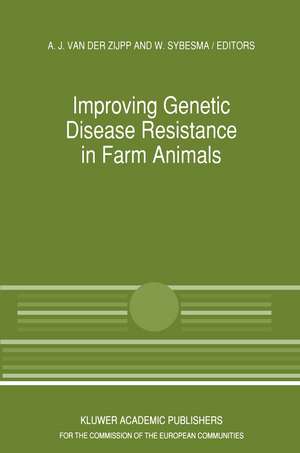Improving Genetic Disease Resistance in Farm Animals: A Seminar in the Community Programme for the Coordination of Agricultural Research, held in Brussels, Belgium, 8–9 November 1988: Current Topics in Veterinary Medicine, cartea 52
Editat de Akke Jitske Akkermans, W. Sybesmaen Limba Engleză Paperback – 15 feb 2012
Din seria Current Topics in Veterinary Medicine
- 5%
 Preț: 384.81 lei
Preț: 384.81 lei - 18%
 Preț: 1233.52 lei
Preț: 1233.52 lei -
 Preț: 401.03 lei
Preț: 401.03 lei - 5%
 Preț: 1417.75 lei
Preț: 1417.75 lei - 5%
 Preț: 381.86 lei
Preț: 381.86 lei - 5%
 Preț: 344.02 lei
Preț: 344.02 lei - 5%
 Preț: 1425.04 lei
Preț: 1425.04 lei - 5%
 Preț: 1437.67 lei
Preț: 1437.67 lei - 5%
 Preț: 354.10 lei
Preț: 354.10 lei - 5%
 Preț: 366.35 lei
Preț: 366.35 lei - 5%
 Preț: 1099.20 lei
Preț: 1099.20 lei - 5%
 Preț: 394.53 lei
Preț: 394.53 lei - 5%
 Preț: 2127.80 lei
Preț: 2127.80 lei - 5%
 Preț: 1423.39 lei
Preț: 1423.39 lei - 5%
 Preț: 1419.94 lei
Preț: 1419.94 lei - 5%
 Preț: 349.09 lei
Preț: 349.09 lei - 5%
 Preț: 2115.20 lei
Preț: 2115.20 lei - 5%
 Preț: 1098.12 lei
Preț: 1098.12 lei - 5%
 Preț: 372.59 lei
Preț: 372.59 lei - 5%
 Preț: 381.91 lei
Preț: 381.91 lei - 5%
 Preț: 363.79 lei
Preț: 363.79 lei - 5%
 Preț: 364.74 lei
Preț: 364.74 lei - 5%
 Preț: 375.46 lei
Preț: 375.46 lei - 5%
 Preț: 2115.92 lei
Preț: 2115.92 lei - 5%
 Preț: 366.19 lei
Preț: 366.19 lei - 5%
 Preț: 1417.02 lei
Preț: 1417.02 lei - 5%
 Preț: 2118.50 lei
Preț: 2118.50 lei - 5%
 Preț: 368.57 lei
Preț: 368.57 lei - 5%
 Preț: 1415.37 lei
Preț: 1415.37 lei - 5%
 Preț: 366.91 lei
Preț: 366.91 lei - 15%
 Preț: 650.86 lei
Preț: 650.86 lei - 18%
 Preț: 1223.88 lei
Preț: 1223.88 lei - 5%
 Preț: 385.74 lei
Preț: 385.74 lei - 18%
 Preț: 1219.01 lei
Preț: 1219.01 lei - 5%
 Preț: 370.74 lei
Preț: 370.74 lei - 5%
 Preț: 1412.26 lei
Preț: 1412.26 lei - 5%
 Preț: 1099.73 lei
Preț: 1099.73 lei -
 Preț: 401.03 lei
Preț: 401.03 lei - 5%
 Preț: 365.46 lei
Preț: 365.46 lei - 5%
 Preț: 1413.56 lei
Preț: 1413.56 lei - 5%
 Preț: 372.03 lei
Preț: 372.03 lei - 5%
 Preț: 366.56 lei
Preț: 366.56 lei
Preț: 363.44 lei
Preț vechi: 382.57 lei
-5% Nou
Puncte Express: 545
Preț estimativ în valută:
69.57€ • 75.59$ • 58.47£
69.57€ • 75.59$ • 58.47£
Carte tipărită la comandă
Livrare economică 21 aprilie-05 mai
Preluare comenzi: 021 569.72.76
Specificații
ISBN-13: 9789401069670
ISBN-10: 9401069670
Pagini: 200
Ilustrații: 192 p.
Dimensiuni: 155 x 235 x 11 mm
Greutate: 0.29 kg
Ediția:Softcover reprint of the original 1st ed. 1989
Editura: SPRINGER NETHERLANDS
Colecția Springer
Seria Current Topics in Veterinary Medicine
Locul publicării:Dordrecht, Netherlands
ISBN-10: 9401069670
Pagini: 200
Ilustrații: 192 p.
Dimensiuni: 155 x 235 x 11 mm
Greutate: 0.29 kg
Ediția:Softcover reprint of the original 1st ed. 1989
Editura: SPRINGER NETHERLANDS
Colecția Springer
Seria Current Topics in Veterinary Medicine
Locul publicării:Dordrecht, Netherlands
Public țintă
ResearchCuprins
Table of Contensts.- Session 1: General aspects Chairperson: A.J. van der Zijpp.- Introduction:.- Biological significance of the MHC.- Session 2: MHC serology and immunology Chairperson: M. Simonsen.- The characterisation and function of the bovine MHC:.- Current status of SLA class I and II serology:.- ELA (Equine Lymphocyte Alloantigens) serology and genetics:.- The chicken MHC and its importance:.- Some evidence for the presence of an MHC analogue in fish:.- Session 3: MHC polymorphism by protein chemistry and DNA techniques Chairperson: R.L. Spooner.- BoLa polymorphism, biochemical analysis at the product level:.- Comparison of BoLa class I and class II typing methods and their application to MHC function studies:.- The molecular genetics of the SLA complex:.- Molecular anatomy of the chicken Major Histocompatibility B complex:.- Session 4: MHC and disease associations Chairpersons: M. Vaiman and S. Lazary.- Possible influence of the Caprine Leucocyte Antigen (CLA) system on development of Caprine Arthritis Encephalitis (CAE) in family and population studies:.- Statistical aspects of cattle MHC (BOLA) and disease associations exemplified by an investigation of subclinical mastitis:.- Possible effects of the pig SLA complex on physiological performances:.- ELA disease associations:.- Session 5: Immune response markers and disease resistance Chairperson: E. Andresen.- An immune competence profile in swine:.- The genetics of parasite resisrance in sheep:.- The Biozzi model applied to the chicken:.- Genetic resistance to bovine mastitis:.- Session 6: General discussion Chairpersons: W. Sybesma and A.J. van der Zijpp.- General Discussions and Conclusions.
Recenzii
`It is recommended for libraries and research workers in the field.'
New Zealand Veterinary Journal, September 1990
New Zealand Veterinary Journal, September 1990




